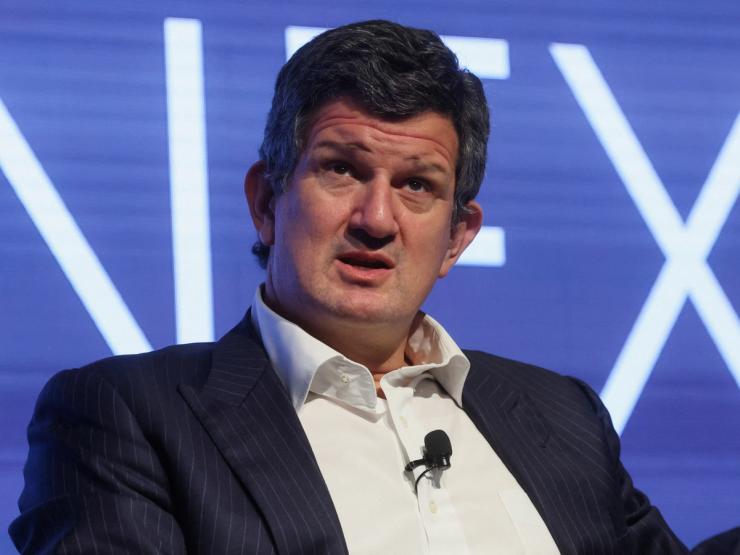The Signal Interview
Two of Steve Hasker’s challenges when he became CEO of Thomson Reuters five years ago were right there in the company’s name. His success would depend in part on him keeping Thomson family shareholders happy, and the Reuters news service would loom larger in most people’s understanding of his business than the non-journalistic operations that deliver most of its profit.
For a media company now valued at $90 billion — roughly five times the market capitalization of News Corp and 10 times that of The New York Times — Thomson Reuters keeps a low profile. Headquartered in Toronto, the controlling family’s hometown, it makes most of its money from a high-margin but unglamorous corner of its industry, providing information and software to lawyers, accountants, and tax professionals.
Since Hasker, an Australian former McKinsey partner, took over at the outset of the COVID-19 pandemic, its stock has roughly tripled, outpacing rivals as revenue growth and profit margins improved. But there was a point when investors took fright at the idea that AI-powered competition might reverse those trends.
When OpenAI announced in March 2023 that its ChatGPT-4 chatbot had passed the Uniform Bar Examination that US lawyers take, it was an “oh, wow” moment, Hasker admits. As analysts predicted that artificial intelligence could shred law firms’ staffing and billing models, he faced questions about whether the threat to his company might be existential.
It took just three months for that mood to change, when a New York judge rebuked two lawyers who had used ChatGPT to craft their argument but failed to notice that it had made up several cases they cited as precedent. The incident made clear that what matters in delivering “professional-grade AI” is the underlying content, Hasker says, “and we have more of that than anyone else, so shame on us if we can’t thrive through this era.”
But the “oh, wow” moment defined his core strategic challenge: how to ensure that Thomson Reuters’ expensive content could retain its value as large language models transform professionals’ ability to access and interpret information.
Build, buy, partner — and sue
Hasker, who earlier ran the talent agency CAA Global and held senior roles at audience measurement group Nielsen, has responded with a “build, buy or partner” approach to sharpening the group’s AI skills — and with litigation that has become a test case for other professional content owners.
Thomson Reuters sued ROSS Intelligence in 2020, claiming that the now-defunct startup had unlawfully copied content from its legal research platform to train an AI model. A federal judge issued a summary judgment this February, agreeing that ROSS’ actions had not been a “fair use” of Thomson Reuters’ material.
Hasker says it was important to bring the case because of the decades of work that his company has put into producing reliable, relevant content: “That’s a valuable asset in which we have invested extensively, and it’s not for someone just to take a photo of and do what they wanted.”
The other assets he is counting on to compete against lavishly resourced Big Tech groups are the expertise that comes with having about 2,500 lawyers on staff, a record of taking data privacy seriously, and relationships with almost 600,000 clients.
When Hasker arrived at Thomson Reuters and began interviewing those customers, though, he found that they loved its content but hated the experience of dealing with the company’s technology. He replaced most of his direct reports, he adds, and told his new team “we’re going to go from a portfolio company to an operating company; we’re going to go from a publisher to a content-driven tech company; and we’re going to go from a company that has traditionally been in the bottom quartile of performers to top decile.”
To position Thomson Reuters as a beneficiary of the generative AI revolution, rather than a victim, Hasker has been looking to overhaul its technology and challenging his team to ask: “Where do we build, where do we buy, where do we partner?”
He boasts of spending $500 million on developing AI-driven products between 2023 and this year, but says such organic investments have been constrained by the difficulty of hiring enough AI-fluent talent. So he has also spent about $2.6 billion acquiring companies that added agentic AI assistants, e-invoicing solutions, and tax automation software to his company’s offerings.
The deals have been funded by the group’s growing free cash flow and proceeds from the sale of Refinitiv, its former financial data business, to the London Stock Exchange Group. Hasker estimates that his team will have another $10 billion in “dry powder” to deploy by 2027. “When you compare that to the [Big Tech] hyperscalers, it’s a small number, but relative to most [companies] in our spaces, it’s a pretty formidable war chest,” he says.
The Thomsons and Reuters
Any potential acquisition has to enhance the experience of one or more groups of Thomson Reuters’ existing customers, Hasker says, and to have sufficient cloud computing and AI capacity so that it comes with no “tech debt” he would need to spend time cleaning up.
Also, he adds, “there has to be value in it for our shareholders.” First among them is Woodbridge, the Thomson family investment company that owns about 70% of Thomson Reuters. Third-generation patriarch David Thomson chairs the board, but demands no special treatment, according to Hasker, who says the directors share “a bedrock belief that what’s good for a public shareholder will be good for the family.”
“Since I’ve been here, we’ve expanded the dividend 10% every year and the stock price has gone up, not down, over time. And so they’re pretty happy,” he says of his relationship with the Thomsons. “I think these things get put to the test when the numbers are moving in a different direction.”
Hasker describes his chairman as “an extraordinarily modest man” despite being a member of Canada’s richest family, and says he has tried as CEO to encourage a “healthy humility” among his executives, cutting off their access to private jets, car services and offices as part of a cost-cutting drive that reduced annual operating expenses by $540 million.
“We’d gotten, like a lot of corporations, a bit focused on titles and compensation and class of travel and size of office,” he says, adding that he takes the streetcar or the subway to his open-plan desks in Toronto and New York. Sitting in an open office gives him a sense of which salespeople have “a spring in their step” when they return from meeting clients, he adds.
The Thomson family’s well-timed sales of its Fleet Street newspapers, North Sea oil assets, and US textbook business earned it a reputation as one of the media industry’s savvier portfolio managers. But its unsentimental approach to once-prized assets has also ensured periodic speculation over the future of Reuters.
“We assess every part of the portfolio for its fit, for its performance, and that includes Reuters. If I were to sit here and say Reuters is off-limits, I think that would be disingenuous,” Hasker says. But he adds that the group has done “a lot of good work” in finding areas where the newsroom’s expertise can benefit its legal, tax and accounting, and corporate clients.
Thomson Reuters’ position in the news business can invite scrutiny that few other professional publishers face, however. In February, President Donald Trump claimed that “Radical Left Reuters” had been paid $9 million by the Department of Defense, and demanded that it return the money.
The furor — stoked by Elon Musk when he was hunting for inefficient spending to eliminate in Washington — mischaracterized a contract with a unit called Thomson Reuters Special Services that serves law enforcement and defense agencies and is run separately from the news organization. Hasker defends Reuters’ independent journalism and says that it has retained “the vast majority” of its government contracts. But he adds that the resilience of a newsroom whose journalists regularly report from active war zones puts such crises in context. “That’s one of the benefits of having Reuters in the portfolio. Everyone else looks [at Reuters] and says, ‘OK, that’s how you behave under fire.’”
What they don’t teach you at McKinsey
Hasker is among a growing cohort of CEOs who spent their formative years in consulting, rather than a traditional “CEO factory” like Procter & Gamble, GE, or IBM. McKinsey taught him “to think 80:20,” tuning out “noise” to focus on what matters most, he says, and to put his ego aside, listen to different viewpoints, and solve problems as part of a team. As companies reject autocratic leaders, “that’s an increasingly important part of being an effective CEO,” he reasons.
Yet he learned one of his most important leadership lessons after leaving McKinsey to work for Dave Calhoun, who ran Nielsen before becoming CEO of a crisis-hit Boeing. Hasker recalls pitching his strategy to Calhoun, only for his new boss to say that he was less interested in a three-year plan than in his ideas for generating “momentum.”
When Hasker pressed for an explanation, Calhoun replied: “If you can create a bit more momentum tomorrow than you have today, you’re going to find that one or two customers want to jump on board, one or two colleagues want to jump on board, some talent from the outside, and then that will beget more momentum.”
You don’t think about that as a consultant, “because you’re there to solve a somewhat intellectual problem,” Hasker says. But “when you’re operating a business, you need to be able to show people that they’re on a winning team.”
Calhoun’s a highly competitive executive, Hasker adds, and his focus on momentum “was about winning tomorrow in order to justify coming back on Monday.”
Notable
- Organizations with “visible” AI strategies are twice as likely to experience revenue growth as those with more ad-hoc approaches, Thomson Reuters’ Future of Professionals Report found.
- The judge overseeing the ROSS Intelligence litigation says the questions it raises are hard, but LawSites writes that the case “could reshape how courts handle AI-related copyright disputes.”


